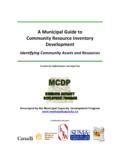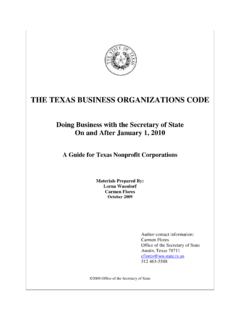Transcription of Bylaw Guide 2010 - Municipal Capacity
1 Municipal Bylaw Guide March 2010 2 Table of Contents 3 3 Authority to Pass 3 Bylaw or Resolution?.. 4 Points to Consider .. 5 Components of a 6 Adoption 10 Assent or Approval .. 11 Amending or Repealing .. 12 The Amending Bylaw .. 12 The Repealing 12 Retention of 13 Enforcement .. 14 Severability .. 14 Quashing .. 14 Further 16 Appendix A Bylaw Checklist .. 17 3 Introduction This manual has been prepared by Saskatchewan Municipal Affairs, Strategy and Sector Relations Branch, to act as a Guide for municipalities in the preparation of Municipal bylaws .
2 For complicated issues it is always a good idea to obtain legal advice to ensure council has the authority for the action set out in the Bylaw and can enforce the Bylaw . Definitions Bylaw means a law of the municipality passed by the Municipal council. Municipal Acts or Municipal Legislation refers to The Municipalities Act; The Northern Municipality Act and The Cities Act. Municipality for the purpose of this manual, municipality refers to an urban municipality, including a town, village, and resort village, a rural municipality, a restructured municipality, a northern municipality or a city.
3 Authority to Pass bylaws Under the Canadian Constitution, the provinces have the authority to create municipalities and to delegate to them certain law-making powers. Laws which municipalities are permitted to pass are called bylaws . Municipalities may pass bylaws within the authority provided through legislation. This authority may be specific or general depending on whether the legislation is permissive or prescriptive. The Municipalities Act and The Cities Act provide municipalities with general powers to pass bylaws within the areas of jurisdiction, in addition specific areas like taxation etc.
4 When statutory authority does not support a Bylaw , expressed or implied, it is ultra vires (beyond the power of the municipality). If such a Bylaw is challenged, the courts will strike it down. If such a Bylaw requires the approval of a provincial ministry or agency, it will not be approved and, therefore, it will have neither force nor effect. Where provisions in a local Bylaw conflict with a provincial Act, the provincial statutory provision normally takes precedence. 4 The authority to pass bylaws is limited in some cases by requiring the approval of a provincial government ministry or agency (ex.)
5 Zoning bylaws ). In other cases, the authority is limited by the fact that some bylaws must be advertised before taking effect (ex. closing of streets). The authority of council to pass bylaws may be further controlled or limited. Electors may require the council to submit a Bylaw to a vote of the electors. When a Bylaw is put to a vote in this fashion, the results of the vote are binding. A Bylaw passed under these circumstances can only be amended or repealed by following very specific procedures. Also, the Saskatchewan Municipal Board, the Municipal acts or other legislation sometimes require that council submit a Bylaw to a vote of the electors.
6 When approved by the electors, it is binding on council. The authority either specific or general to pass a Bylaw must be found in the applicable legislation ( The Municipalities Act, The Northern Municipalities Act or The Cities Act or other legislation such as The Planning & Development Act, 2007). The general power to pass bylaws provisions of Municipal legislation seem to provide unlimited autonomy to council; however such all-encompassing powers can be deceptive. Municipal bylaws shall not conflict with or infringe upon legislation or regulations enacted by government.
7 Provincial and federal levels of government have passed many laws dealing with public order, health, safety, and so on. These provincial and federal rules ( The Criminal Code of Canada) would take precedence over any local bylaws . Bylaw or Resolution? The formalities leading to the passing of a resolution are less restrictive than those for the passing of a Bylaw . The powers of council are exercised by Bylaw in more important matters, particularly those affecting the public or a section of the public. Resolutions usually deal with matters of a minor, administrative nature such as adjourning a meeting or appointing an auditor.
8 5 Legislation will define those powers which may only be exercised by Bylaw . bylaws should be used to address important, ongoing matters which have general application, or where a penalty is involved ( licensing). It is always good practice to consult the municipality s solicitor when drafting new bylaws . Points to Consider Obtain draft bylaws from Municipal Affairs and various other government ministries if they are available. Municipal Affairs has posted sample bylaws on its website at Another option is the Offsite Library which provides links to municipalities who have some or all of their bylaws on local web sites.
9 Discuss your proposed Bylaw with experienced Administrators of other municipalities and obtain copies of their bylaws . Consult a solicitor if the Bylaw is complex or if you are uncertain of its validity. If the Bylaw is long, break it up into numbered sections and use headings. Try to stick to terms, phrases and wording used in the statute or in the definition section of the Bylaw . Avoid legal jargon and words other than from the English language. Do not use different words to mean the same thing. Use shall to show that a certain action must or must not be done.
10 Use may to show an action that is permissive. Use only those clauses that are necessary ( if no penalty is required, do not use a penalty clause). Schedules and forms should be designated with numbers and letters ( Schedule 1 or Form A ). 6 Distribute copies of the draft Bylaw to all members of council prior to the meeting. Depending on the issue, public participation may be a wise option before the final reading. Components of a Bylaw Corporate Name This is the full name of the municipality. Municipalities may include a coat of arms on bylaws . Examples: Rural Municipality of ____ No.







